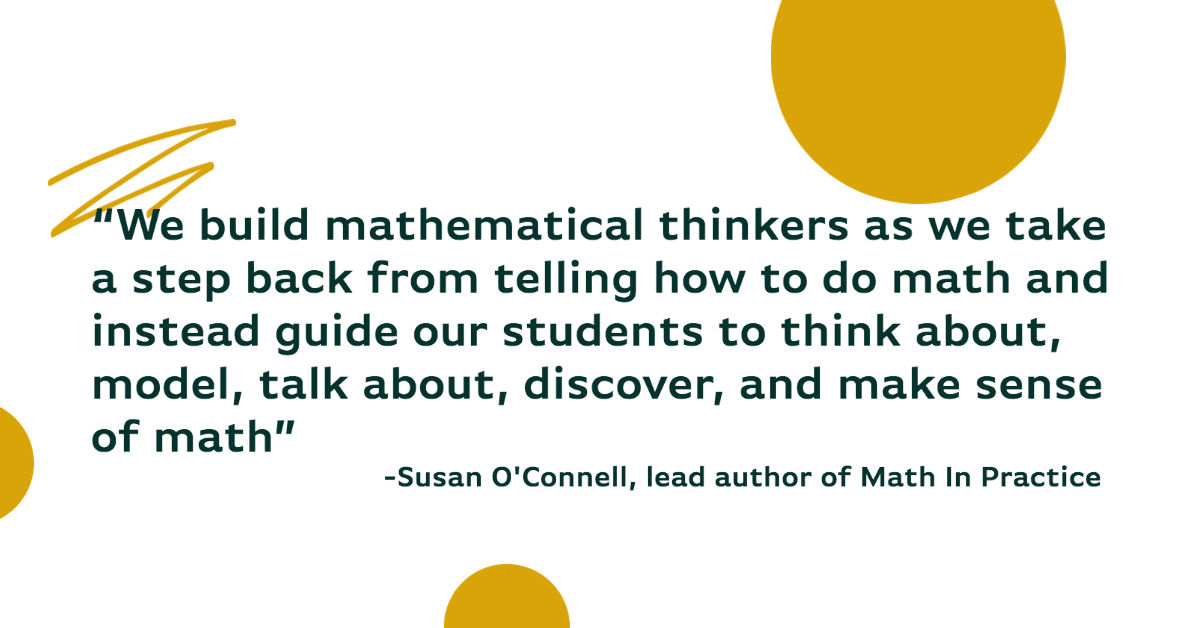 As an Elementary Math Coach, you have a critical role in moving math instruction forward within your school or district. Building teacher capacity has many challenges, and the responsibility can be daunting. You may be torn between many facets of the job as you work to deepen some teachers’ understanding of their math standards, increase other teachers’ knowledge of math content, expand teachers’ repertoire of instructional strategies, and transform teachers’ beliefs regarding what is important in mathematics. How can you meet the varied needs of elementary math teachers? What are some critical actions that support your goals? Consider the following:
As an Elementary Math Coach, you have a critical role in moving math instruction forward within your school or district. Building teacher capacity has many challenges, and the responsibility can be daunting. You may be torn between many facets of the job as you work to deepen some teachers’ understanding of their math standards, increase other teachers’ knowledge of math content, expand teachers’ repertoire of instructional strategies, and transform teachers’ beliefs regarding what is important in mathematics. How can you meet the varied needs of elementary math teachers? What are some critical actions that support your goals? Consider the following:
- Do I capitalize on the use of planning time to nurture a deep understanding of math standards?
While textbooks offer a wealth of activities, they often lead teachers into a turn-to-the-next-page teaching approach. Collaborative planning, guided by a math coach, begins with the identification of specific learning outcomes and involves discussions about standards progressions and connections. The planning focuses on standards. When teachers have time to think about what came before and what comes after their grade-level standards, and are able to discuss the standards in depth, they are better able to select tasks that link to the standards. While we explore standards in other professional learning formats (faculty meetings, PLCs…), collaborative planning offers the opportunity to explore and unpack the standards in real time throughout the year and links the standards discussions to classroom planning. -
Do I disseminate math tasks or help teachers become experts at selecting and designing meaningful math tasks?
Math tasks are everywhere, but not all tasks are equal. It is not enough to locate a task for teaching a skill, teachers must develop the ability to evaluate tasks and select ones that are appropriate to the standard and to their students. When selecting a task to introduce a math concept and build mathematical understanding, would a paper/pencil task be the most appropriate or might students gain more understanding through tasks that include context, models, and math talk? Discussions about task selection build teacher expertise and empower teachers to choose or design meaningful tasks rather than simply turning pages. - Do I ensure that students’ needs are a part of the planning process by building teacher expertise in identifying strengths and needs and determining next steps?
Simply following someone else’s series of pre-planned lessons has not proven to be a successful teaching plan for many of our students. When teachers listen to students’ conversations, observe them at work, and examine their written responses, they are more able to adjust their teaching plans to move students toward proficiency. Rather than reviewing student work to assign a grade, teachers benefit from discussions in which they review student work to identify students’ strengths and needs, and then use their insights to determine reasonable next steps. Through work with a math coach, teachers gain experience and confidence discussing and evaluating student work and brainstorming appropriate next steps. - Do I structure ongoing professional learning?
Professional learning happens over time. A math coach provides ongoing support by guiding the learning every step of the way. Whether through collaborative planning, demonstration lessons, co-teaching, or informal discussions, coaches step in to discuss the math content, clarify the math standard, or suggest teaching options or next steps. Rather than single-session professional learning opportunities, math coaches recognize that growth happens over time and with support. - Am I a reflective practitioner and do I model that for the teachers with whom I work?
Reflective teachers grow as professionals. They are open to new teaching ideas, they take risks, and they evaluate instructional strategies. So, how do we build reflective practitioners? How do we nurture the attitude that we should all be growing and learning? How do we build a learning community within our schools and districts? Teachers, schools, and districts benefit from math coaches who exemplify professional learning in their own lives, who share their enthusiasm for that learning, who take risks to expand their skills and encourage teachers to do the same, and who pose ongoing and supportive opportunities for teachers to continue their own learning.
As an Elementary Math Coach, you transform math teaching through a focus on standards, content, instructional strategies, and dispositions. By supporting and expanding teacher capacity on a daily basis, you have the potential to transform classrooms into places in which both students and teachers grow as learners.

 Susan O’Connell has decades of experience supporting teachers in making sense of mathematics and effectively shifting how they teach. As a former elementary teacher, reading specialist, and math coach, Sue knows what it’s like in the classroom and her background is evident throughout her work as she unpacks best practices in a clear, practical, and upbeat way.
Susan O’Connell has decades of experience supporting teachers in making sense of mathematics and effectively shifting how they teach. As a former elementary teacher, reading specialist, and math coach, Sue knows what it’s like in the classroom and her background is evident throughout her work as she unpacks best practices in a clear, practical, and upbeat way.
She is the lead author of Math in Practice, a new grade-by-grade K-5 professional learning resource. She is also coauthor of the bestselling Putting the Practices Into Action, Mastering the Basic Math Facts in Addition and Subtraction, and Mastering the Basic Math Facts in Multiplication and Division. She served as editor of Heinemann’s popular Math Process Standards series and also wrote the bestselling Now I Get It.
Sue is a nationally known speaker and education consultant who directs Quality Teacher Development, an organization committed to providing outstanding math professional development for schools and districts across the country.
Watch an introductory Math in Practice webinar, hosted by Sue.
Click here to watch Sue talk about the links between reading and math.
Connect with Sue on Twitter @SueOConnellMath



